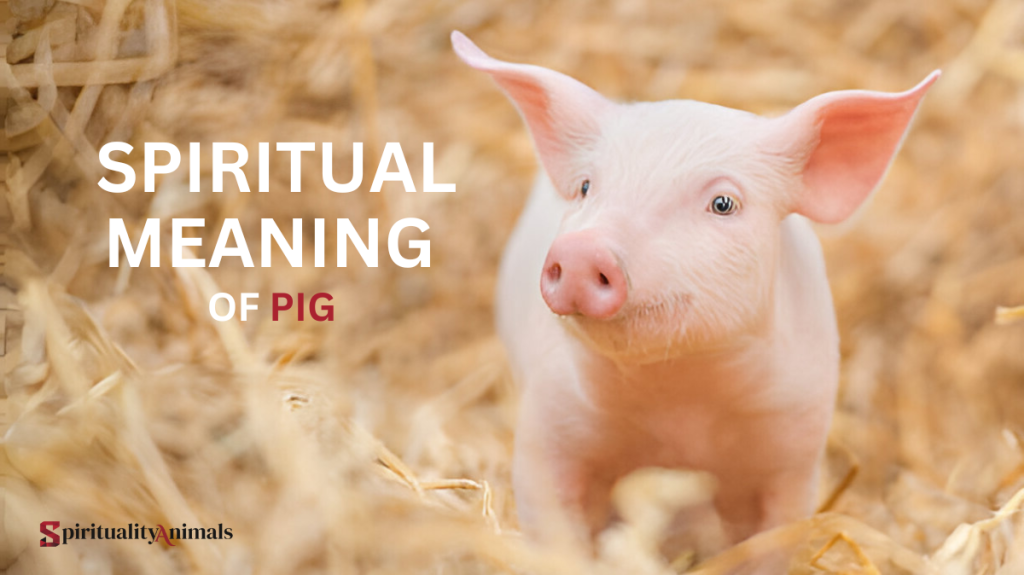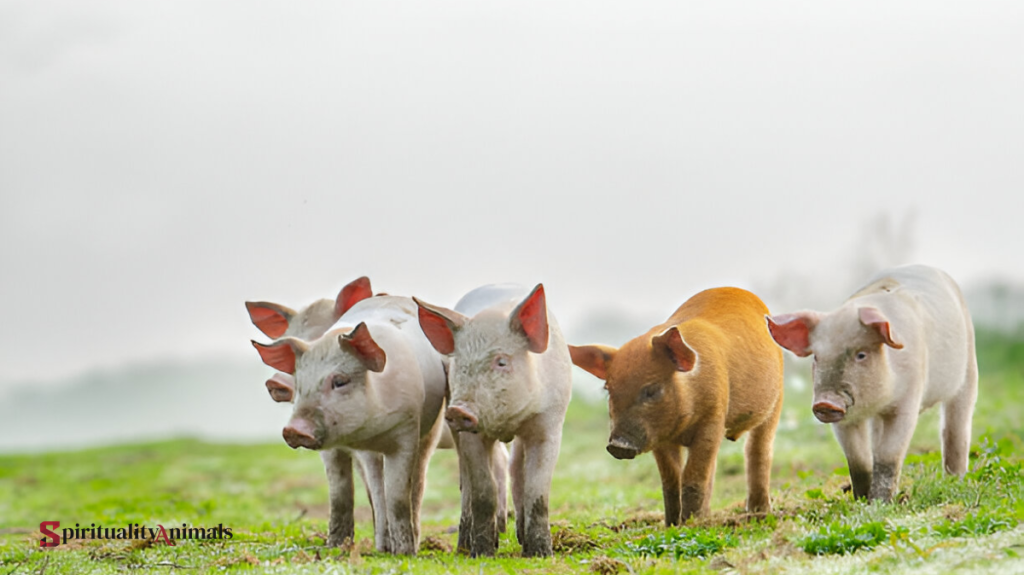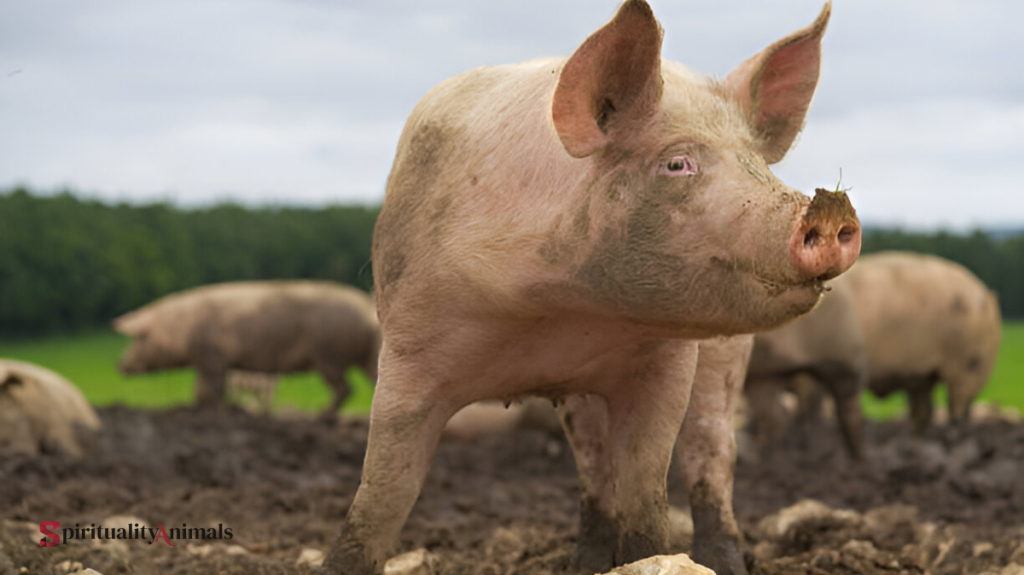The pig appears in spiritual beliefs all around the world. For thousands of years, people have seen these animals as more than just farm animals.
They hold special meanings in many cultures. Some see pigs as symbols of luck and wealth. Others view them as signs of greed or uncleanliness. We explores what pigs mean in different spiritual traditions.
We’ll look at how people have viewed pigs throughout history and what lessons these animals might teach us.

Contents
- 1 Brief Answer on Spiritual Meaning of Pig
- 2 Overview of Pig Symbolism
- 3 Importance of Pig in Spirituality
- 4 Meaning and Messages of the Pig in Spirituality
- 5 Types of Pig and their Meaning
- 6 Historical Context: Pigs Through Time
- 7 Spiritual Signs and Characteristics of Pigs
- 8 Positive Traits of the Pig in Spirituality
- 9 Negative Traits of the Pig in Spirituality
- 10 Spiritual Lessons the Pig Teaches Us
- 11 The Pig as a Power Animal
- 12 Christianity Symbolism: Pigs in the Bible
- 13 Totem or Spirit Animals: Pig as a Totem
- 14 Dream Interpretation: Seeing a Pig in Your Dream
- 15 Mythology and Folklore: The Pig in Stories
- 16 Tattoos and Their Meanings: Pig Symbolism
- 17 Conclusion
- 18 Frequently Asked Questions
Brief Answer on Spiritual Meaning of Pig
The primary spiritual meaning of a pig centers on abundance, fertility, and prosperity. It symbolizes wealth, good fortune, and the bountifulness of the earth.
Conversely, in some spiritual traditions, it represents uncleanliness and greed.
Overview of Pig Symbolism
Pigs connect to many spiritual ideas. They often stand for abundance because they can have many babies at once. In some places, pigs represent good fortune and prosperity.
The word “pig” often appears near words like “wealth,” “earth,” and “home” in many stories and sayings. When we look at common phrases, pigs link to ideas of plenty, but sometimes also to messiness or greed.
The pig’s meaning changes depending on where you are in the world and what culture you’re looking at.
Importance of Pig in Spirituality
Pigs hold a special place in many spiritual systems. In Chinese astrology, the Pig is one of the twelve zodiac animals. People born in the Year of the Pig are thought to be honest, kind, and hard-working.
In ancient Egypt, the sky goddess Nut sometimes appeared as a pig. The Celtic people saw pigs as sacred animals with connections to the otherworld. Even today, the pig still appears in spiritual practices, good luck charms, and as symbols in art and stories around the world.
Meaning and Messages of the Pig in Spirituality
The pig often carries messages about enjoying life’s pleasures. They remind us to appreciate good food, comfort, and rest. Pigs also teach about using resources wisely. As animals that can find food almost anywhere, they show adaptability.
When a pig appears in your life as a spiritual sign, it might be telling you to enjoy what you have, to dig deeper for hidden treasures, or to remember your connection to the earth.
The pig’s spiritual message often focuses on finding satisfaction in simple things.
See Also: Spiritual Meaning of Mammals
Types of Pig and their Meaning
Kunekune
The Kunekune pig comes from New Zealand. The Maori people kept these friendly pigs for centuries. The name “Kunekune” means “fat and round.” In spiritual terms, they represent joy and friendship.
Their gentle nature reminds us to be kind to others and to enjoy community. People who feel drawn to Kunekune energy might be natural peacemakers.
Duroc Pig
The reddish-brown Duroc pig started in America. They’re known for being strong and hardy. In spiritual meanings, the Duroc represents determination and physical strength.
Their red color connects them to energy and vitality. The Duroc pig reminds us to stay strong during hard times and to keep working toward our goals.
Hampshire Pig
Hampshire pigs have black bodies with a white band around their shoulders, like they’re wearing a belt. This distinct look gives them spiritual meaning related to balance and boundaries.
The clear line between black and white reminds us that sometimes we need clear divisions in our lives. Hampshire energy encourages setting healthy limits.
Vietnamese Pot-bellied
These small pigs with round bellies have become popular pets. In spiritual terms, pot-bellied pigs represent home, comfort, and family bonds.
Their friendly nature and intelligence remind us to value close relationships. They teach us that intelligence can come in unexpected packages and that size doesn’t determine worth.
Mangalica
The Mangalica pig from Hungary has curly hair that looks like a sheep’s wool. This unusual pig symbolizes transformation and not judging by appearances.
Spiritually, the Mangalica reminds us that things aren’t always what they seem. Their ability to survive cold weather represents endurance during emotional “winters” in our lives.
Berkshire Pig
Berkshire pigs, with their black coats and white points, come from England. They’re known for delicious meat. In spiritual contexts, they represent quality over quantity and the importance of taking time to develop talents.
The Berkshire’s calm temperament teaches patience and the rewards of doing things well rather than quickly.
Poland China
The Poland China pig breed developed in Ohio, not Poland or China. This mix-up in the name carries a spiritual lesson about mistaken identities.
These large pigs represent strength and productivity. Their spiritual message focuses on working steadily toward abundance and not worrying about labels others give you.
Black Iberian Pig
Found in Spain and Portugal, these pigs roam oak forests eating acorns. Their freedom and connection to nature give them spiritual meaning related to living naturally.
They teach us about the value of freedom and finding nourishment in natural sources. Their dark color links them to mystery and hidden wisdom.
Large Black
The Large Black pig from England has long, droopy ears that cover their eyes. Spiritually, this represents looking inward rather than focusing on the outside world.
These pigs remind us of the importance of listening more than seeing and developing inner wisdom. Their calm nature encourages peaceful reflection.

Historical Context: Pigs Through Time
Humans started keeping pigs about 9,000 years ago. Throughout history, pigs have played important roles in many societies. In ancient Egypt, they were both valued and sometimes considered unclean.
The Greeks and Romans sacrificed pigs to earth goddesses. Medieval Europeans relied on pigs for food, and families often kept a pig for winter meat.
The animal’s role shifted over time from wild forest creature to farm animal to symbol in stories and religion. Through all these changes, pigs have remained closely tied to human ideas about food, wealth, and the earth.
Spiritual Signs and Characteristics of Pigs
The Pig in Western Culture
In the West, pigs have mixed meanings. On one hand, phrases like “pig out” or “piggy bank” show connections to abundance and saving. On the other hand, calling someone a “pig” is usually an insult.
Pigs appear in children’s stories like “The Three Little Pigs,” teaching lessons about hard work. The piggy bank teaches children about saving money.
Words that often appear near “pig” in Western writing include “farm,” “pink,” “dirty,” and “money,” showing the range of meanings we attach to these animals.
The Pig in Eastern Cultures
In China, the pig ranks as the twelfth animal in the zodiac cycle. People born in Pig years are thought to be honest, kind, and willing to help others. In Japan, wild boars represent courage and determination.
The Vietnamese view pigs as symbols of wealth and good fortune. In many parts of Asia, the wild pig or boar represents strength and fearlessness. Words frequently paired with “pig” in Eastern contexts include “luck,” “fortune,” “honesty,” and “home.”
The Pig in Native American Culture
Different Native American tribes viewed pigs in different ways. After European settlers brought pigs to North America, some tribes included them in their stories.
The Navajo sometimes see pigs as symbols of gluttony but also of abundance. Other tribes connect wild boars with courage and protection. The javelina, or peccary, appears in Southwestern tribal art as a symbol of survival in harsh conditions.
Positive Traits of the Pig in Spirituality
Spiritually, pigs represent many positive qualities. They symbolize abundance because they often have large litters of piglets. Their ability to find food anywhere shows resourcefulness.
Pigs are also very intelligent, ranking among the smartest animals. They represent enjoyment of life’s pleasures and living in the moment.
In many traditions, pigs connect to the earth element, showing groundedness and practicality. Their rounded shape links them to ideas of completeness and satisfaction.
Negative Traits of the Pig in Spirituality
Some spiritual traditions focus on less positive pig traits. Their enjoyment of food can represent overindulgence or greed. Their habit of rooting in mud connects them to ideas of uncleanliness in some religions.
When pigs appear as warnings in spiritual contexts, they might be cautioning against excess, waste, or focusing too much on material pleasures. The phrase “pearls before swine” suggests an inability to appreciate valuable things.
Spiritual Lessons the Pig Teaches Us
Pigs offer many spiritual lessons. They teach us to enjoy simple pleasures like good food and rest. Their intelligence reminds us not to judge by appearances. From the pig, we learn about finding value in things others might overlook.
Pigs show us how to adapt to different situations and make the best of what we have. They remind us of our connection to the earth and the importance of staying grounded.
Perhaps most importantly, pigs teach us balance enjoying life’s pleasures while not becoming ruled by them.
The Pig as a Power Animal
As a power animal, the pig brings gifts of abundance and enjoyment. When pig energy enters your life, it might be time to focus on prosperity and making the most of your resources.
The pig power animal helps people who need to reconnect with joy or who have been denying themselves pleasure. It also assists those who need help finding hidden opportunities.
Pig medicine teaches us to dig beneath the surface to find nourishment and to trust our instincts about where to look for what we need.
Christianity Symbolism: Pigs in the Bible
In the Bible, pigs often appear in a negative light. Jewish dietary laws forbid eating pork, calling pigs unclean. In the New Testament, Jesus cast demons into a herd of pigs that then ran into the sea.
The prodigal son story mentions how the young man ended up feeding pigs, showing how far he had fallen. However, some Christian scholars point out that these negative views were specific to the time and place.
The spiritual lesson might be about transformation rather than the animal itself being bad.

Totem or Spirit Animals: Pig as a Totem
People with the pig as a totem animal often enjoy life’s pleasures. They may be generous, honest, and patient. Having a pig totem can mean you’re good at finding resources and making the most of what you have.
Pig people often feel connected to the earth and enjoy physical comforts. They tend to be loyal friends who value home and family.
If pig is your totem, you might have a talent for discovering hidden treasures that others miss, whether that’s opportunities, information, or actual items of value.
Dream Interpretation: Seeing a Pig in Your Dream
Dreaming about pigs can have many meanings. A healthy, happy pig often suggests coming abundance or good fortune. A pig in mud might represent enjoying simple pleasures.
A wild boar could indicate facing challenges with courage. A piggy bank might relate to your attitudes about saving or spending money.
The color, size, and behavior of the pig in your dream all affect its meaning. Pay attention to how you feel about the pig in the dream your emotions provide important clues to what your subconscious is telling you.
Mythology and Folklore: The Pig in Stories
The Pig in Greek Mythology
In Greek myths, pigs appear in several important stories. The goddess Demeter considered pigs sacred animals. In Homer’s Odyssey, the sorceress Circe turned Odysseus’s men into pigs, perhaps symbolizing giving in to base desires.
The hero Hercules captured the Erymanthian Boar as one of his twelve labors, showing victory over wild forces. These stories use pigs to explore ideas about human nature, transformation, and the balance between enjoying life and controlling our impulses.
The Pig in European Folklore
European folk tales often feature pigs. “The Three Little Pigs” teaches children about planning ahead and working hard. In northern Europe, the wild boar represented courage and appeared on family crests.
Fairy tales sometimes show pigs as magical creatures that bring luck. The Christmas tradition of the Yule Boar, still celebrated in some places with marzipan pigs, connects pigs to winter celebrations and hopes for plenty in the coming year.
Tattoos and Their Meanings: Pig Symbolism
Pig tattoos carry different meanings depending on the design. A simple pig might represent enjoyment of life or a laid-back attitude. Flying pigs (“when pigs fly”) can symbolize achieving the impossible or keeping hope alive. In sailor traditions, pig tattoos were thought to protect against drowning.
Chinese-style pig tattoos often connect to the zodiac and traits like honesty and kindness. The style and details of the pig tattoo change its spiritual meaning a wild boar suggests strength, while a piglet might represent new beginnings.
Conclusion
The spiritual meaning of pigs changes across cultures and times. From symbols of plenty to warnings against excess, pigs carry many messages. They teach us about enjoying life’s pleasures while staying grounded.
They remind us that intelligence and value can exist in unexpected places. Whether you see pigs as lucky symbols, wise teachers, or reminders of our connection to the earth, these animals offer rich spiritual lessons.
By understanding what pigs have meant to people throughout history, we gain new perspectives on abundance, enjoyment, and finding hidden treasures in everyday life.
Frequently Asked Questions
What does it mean if I see pigs repeatedly in my daily life?
Seeing pigs often might be a reminder to enjoy simple pleasures or to look for hidden opportunities around you. It could also suggest coming abundance or the need to stay grounded.
Are pigs considered lucky in all cultures?
No, pig symbolism varies widely. In Chinese culture, pigs often represent good fortune, while some religious traditions view them negatively. Context matters when understanding pig symbols.
What spiritual message does a wild boar carry versus a farm pig?
Wild boars usually represent courage, strength, and facing challenges head-on. Farm pigs more often connect to ideas of abundance, home, and enjoying life’s comforts.
Why do pigs symbolize wealth in some traditions?
Historically, families who owned pigs had food security for the winter. Pigs also have many babies at once and can find food even in tough conditions, all connecting them to ideas of plenty.
What should I focus on if the pig appears as my spirit animal?
Pay attention to finding joy in simple things, using resources wisely, and looking beneath the surface for opportunities. Pig energy also encourages honesty and living in harmony with the earth.
Disclaimer: At SpiritualityAnimals, we share spiritual and symbolic interpretations based on traditional wisdom and personal insights. Our content is purely informational and should not replace professional guidance.
